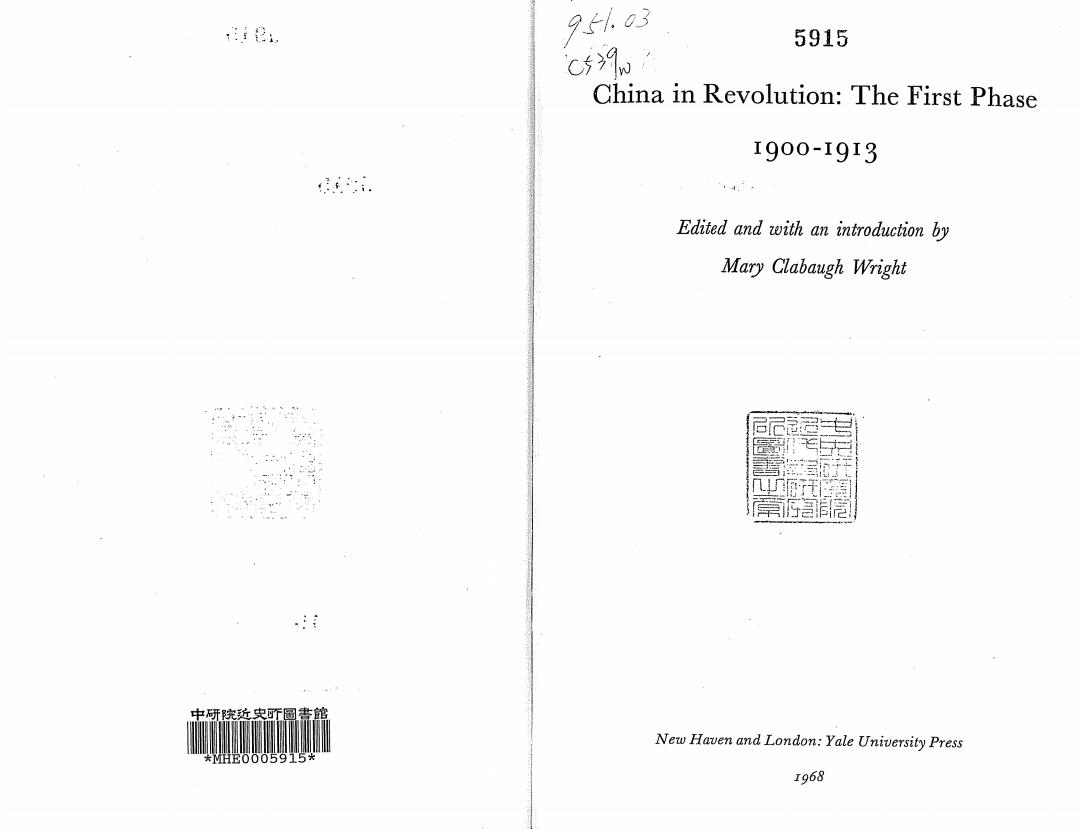
961.03 5915 C59’ China in Revolution:The First Phase I900-I9I3 Edited and with an introduction by Mary Clabaugh Wright ” 常恺 中研完行史四下 New Haven and London:Yale University Press 1968
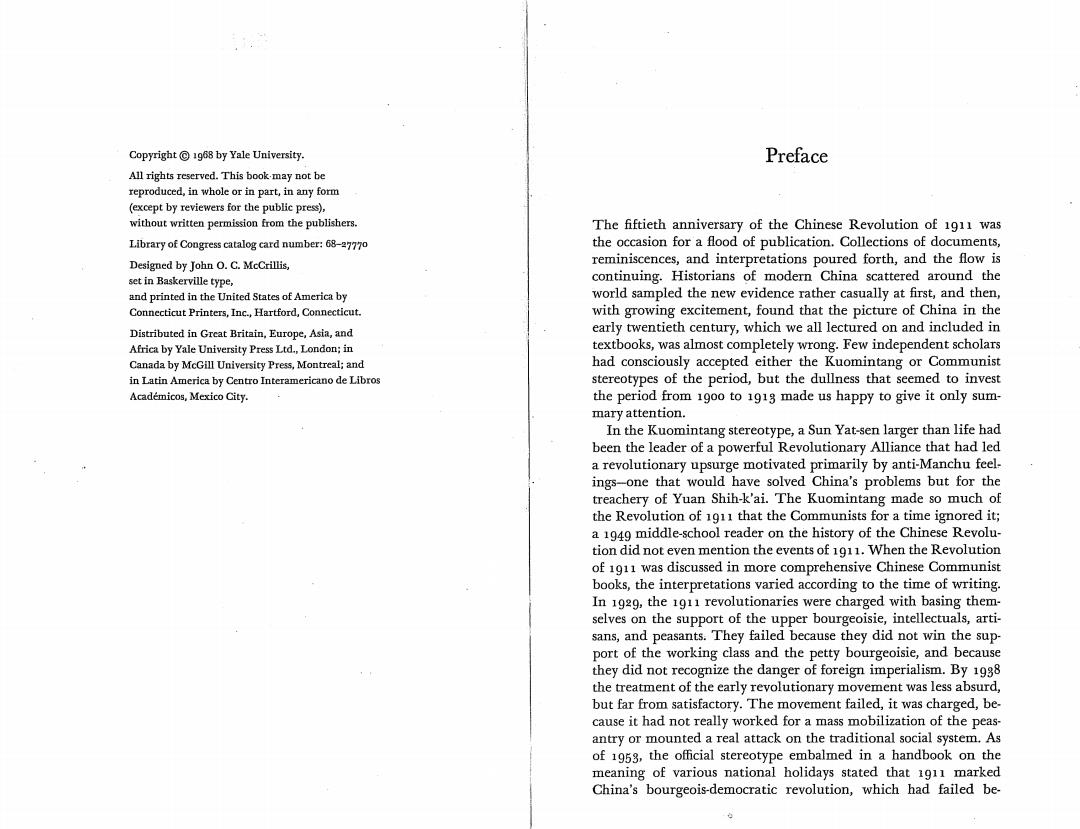
Copyright C 1968 by Yale University. Preface All rights reserved.This book may not be reproduced,in whole or in part,in any form (except by reviewers for the public press), without written permission from the publishers. The fiftieth anniversary of the Chinese Revolution of 1911 was Library of Congress catalog card number:68-27770 the occasion for a flood of publication.Collections of documents, Designed by John O.C.McCrillis, reminiscences,and interpretations poured forth,and the flow is set in Baskerville type, continuing.Historians of modern China scattered around the and printed in the United States of America by world sampled the new evidence rather casually at first,and then, Connecticut Printers,Inc.,Hartford,Connecticut. with growing excitement,found that the picture of China in the Distributed in Great Britain,Europe,Asia,and early twentieth century,which we all lectured on and included in Africa by Yale University Press Ltd.London:in textbooks,was almost completely wrong.Few independent scholars Canada by McGill University Press,Montreal;and had consciously accepted either the Kuomintang or Communist in Latin America by Centro Interamericano de Libros stereotypes of the period,but the dullness that seemed to invest Academicos,Mexico City. the period from 1goo to 1913 made us happy to give it only sum- mary attention. In the Kuomintang stereotype,a Sun Yat-sen larger than life had been the leader of a powerful Revolutionary Alliance that had led a revolutionary upsurge motivated primarily by anti-Manchu feel- ings-one that would have solved China's problems but for the treachery of Yuan Shih-k'ai.The Kuomintang made so much of the Revolution of 1911 that the Communists for a time ignored it; a 1949 middle-school reader on the history of the Chinese Revolu- tion did not even mention the events of 1911.When the Revolution of 1911 was discussed in more comprehensive Chinese Communist books,the interpretations varied according to the time of writing. In 1929,the 1911 revolutionaries were charged with basing them- selves on the support of the upper bourgeoisie,intellectuals,arti- sans,and peasants.They failed because they did not win the sup- port of the working class and the petty bourgeoisie,and because they did not recognize the danger of foreign imperialism.By 1938 the treatment of the early revolutionary movement was less absurd, but far from satisfactory.The movement failed,it was charged,be- cause it had not really worked for a mass mobilization of the peas. antry or mounted a real attack on the traditional social system.As of 1953,the official stereotype embalmed in a handbook on the meaning of various national holidays stated that 1911 marked China's bourgeois-democratic revolution,which had failed be-
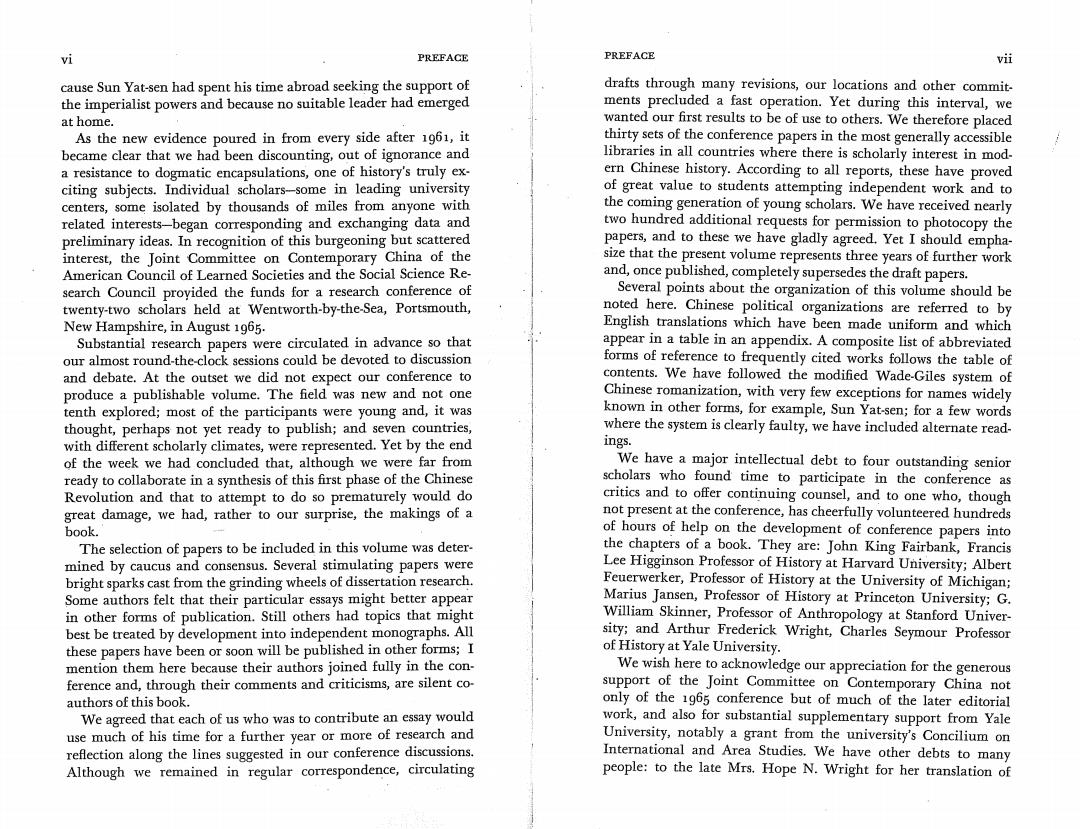
vi PREFACE PREFACE vii cause Sun Yat-sen had spent his time abroad seeking the support of drafts through many revisions,our locations and other commit- the imperialist powers and because no suitable leader had emerged ments precluded a fast operation.Yet during this interval,we at home. wanted our first results to be of use to others.We therefore placed As the new evidence poured in from every side after 1961,it thirty sets of the conference papers in the most generally accessible became clear that we had been discounting,out of ignorance and libraries in all countries where there is scholarly interest in mod- a resistance to dogmatic encapsulations,one of history's truly ex- ern Chinese history.According to all reports,these have proved citing subjects.Individual scholars-some in leading university of great value to students attempting independent work and to centers,some isolated by thousands of miles from anyone with the coming generation of young scholars.We have received nearly related interests-began corresponding and exchanging data and two hundred additional requests for permission to photocopy the preliminary ideas.In recognition of this burgeoning but scattered papers,and to these we have gladly agreed.Yet I should empha- interest,the Joint Committee on Contemporary China of the size that the present volume represents three years of further work American Council of Learned Societies and the Social Science Re- and,once published,completely supersedes the draft papers. search Council proyided the funds for a research conference of Several points about the organization of this volume should be twenty-two scholars held at Wentworth-by-the-Sea,Portsmouth, noted here.Chinese political organizations are referred to by New Hampshire,in August 1965. English translations which have been made uniform and which Substantial research papers were circulated in advance so that appear in a table in an appendix.A composite list of abbreviated our almost round-the-clock sessions could be devoted to discussion forms of reference to frequently cited works follows the table of and debate.At the outset we did not expect our conference to contents.We have followed the modified Wade-Giles system of produce a publishable volume.The field was new and not one Chinese romanization,with very few exceptions for names widely tenth explored;most of the participants were young and,it was known in other forms,for example,Sun Yat-sen;for a few words thought,perhaps not yet ready to publish;and seven countries, where the system is clearly faulty,we have included alternate read- with different scholarly climates,were represented.Yet by the end ings. of the week we had concluded that,although we were far from We have a major intellectual debt to four outstanding senior ready to collaborate in a synthesis of this first phase of the Chinese scholars who found time to participate in the conference as Revolution and that to attempt to do so prematurely would do critics and to offer continuing counsel,and to one who,though great damage,we had,rather to our surprise,the makings of a not present at the conference,has cheerfully volunteered hundreds book. of hours of help on the development of conference papers into The selection of papers to be included in this volume was deter- the chapters of a book.They are:John King Fairbank,Francis mined by caucus and consensus.Several stimulating papers were Lee Higginson Professor of History at Harvard University;Albert bright sparks cast from the grinding wheels of dissertation research. Feuerwerker,Professor of History at the University of Michigan; Some authors felt that their particular essays might better appear Marius Jansen,Professor of History at Princeton University;G. in other forms of publication.Still others had topics that might William Skinner,Professor of Anthropology at Stanford Univer- best be treated by development into independent monographs.All sity;and Arthur Frederick Wright,Charles Seymour Professor these papers have been or soon will be published in other forms;I of History at Yale University. mention them here because their authors joined fully in the con- We wish here to acknowledge our appreciation for the generous ference and,through their comments and criticisms,are silent co- support of the Joint Committee on Contemporary China not authors of this book. only of the 1965 conference but of much of the later editorial We agreed that each of us who was to contribute an essay would work,and also for substantial supplementary support from Yale use much of his time for a further year or more of research and University,notably a grant from the university's Concilium on reflection along the lines suggested in our conference discussions. International and Area Studies.We have other debts to many Although we remained in regular correspondence,circulating people:to the late Mrs.Hope N.Wright for her translation of
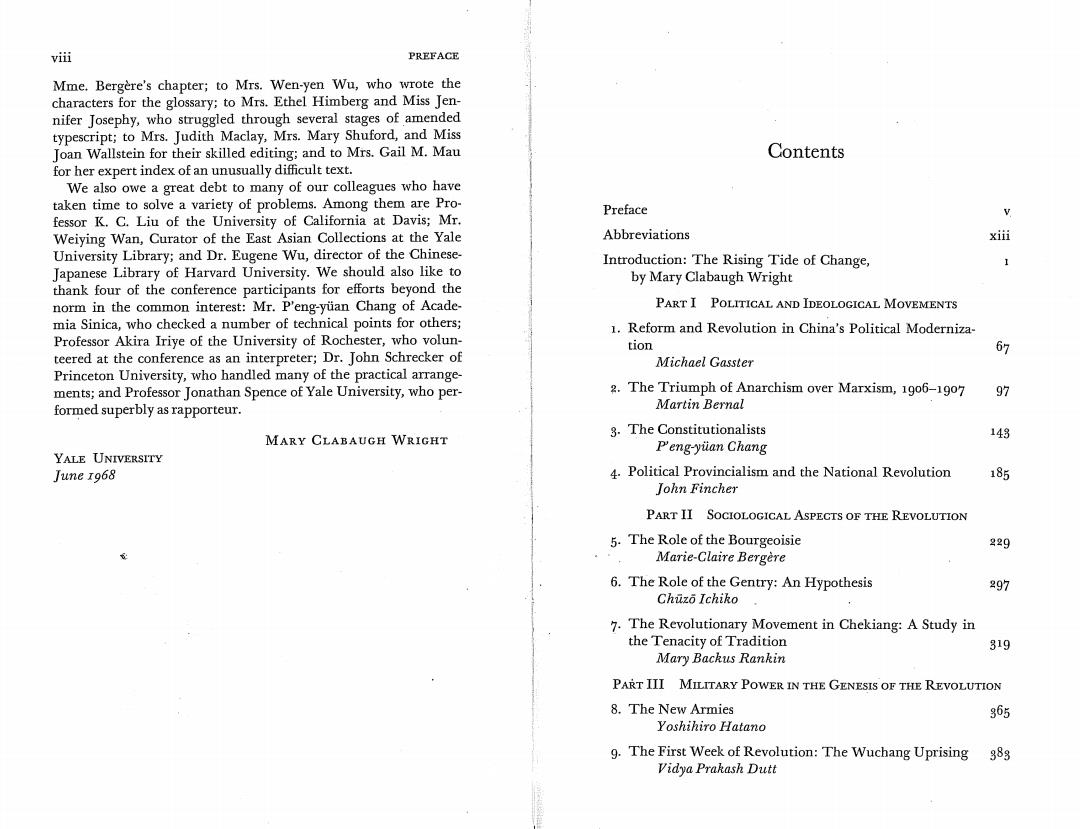
viii PREFACE Mme.Bergere's chapter;to Mrs.Wen-yen Wu,who wrote the characters for the glossary;to Mrs.Ethel Himberg and Miss Jen- nifer Josephy,who struggled through several stages of amended typescript;to Mrs.Judith Maclay,Mrs.Mary Shuford,and Miss Joan Wallstein for their skilled editing;and to Mrs.Gail M.Mau Contents for her expert index of an unusually difficult text. We also owe a great debt to many of our colleagues who have taken time to solve a variety of problems.Among them are Pro- Preface fessor K.C.Liu of the University of California at Davis;Mr. Weiying Wan,Curator of the East Asian Collections at the Yale Abbreviations xiii University Library;and Dr.Eugene Wu,director of the Chinese- Introduction:The Rising Tide of Change, 1 Japanese Library of Harvard University.We should also like to by Mary Clabaugh Wright thank four of the conference participants for efforts beyond the norm in the common interest:Mr.P'eng-yuian Chang of Acade- PART I POLITICAL AND IDEOLOGICAL MOVEMENTS mia Sinica,who checked a number of technical points for others; 1.Reform and Revolution in China's Political Moderniza- Professor Akira Iriye of the University of Rochester,who volun- tion teered at the conference as an interpreter;Dr.John Schrecker of Michael Gasster Princeton University,who handled many of the practical arrange- ments;and Professor Jonathan Spence of Yale University,who per- 2.The Triumph of Anarchism over Marxism,1906-1907 97 formed superbly as rapporteur. Martin Bernal 3.The Constitutionalists MARY CLABAUGH WRIGHT 143 Pengyiian Chang YALE UNIVERSITY June 1968 4.Political Provincialism and the National Revolution 85 John Fincher PART II SOCIOLOGICAL ASPECTS OF THE REVOLUTION 5.The Role of the Bourgeoisie 229 。 Marie-Claire Bergere 6.The Role of the Gentry:An Hypothesis 97 Chuzo Ichiko 7.The Revolutionary Movement in Chekiang:A Study in the Tenacity of Tradition 319 Mary Backus Rankin PART III MILITARY POWER IN THE GENESIS OF THE REVOLUTION 8.The New Armies 365 Yoshihiro Hatano 9.The First Week of Revolution:The Wuchang Uprising 888 Vidya Prakash Dutt
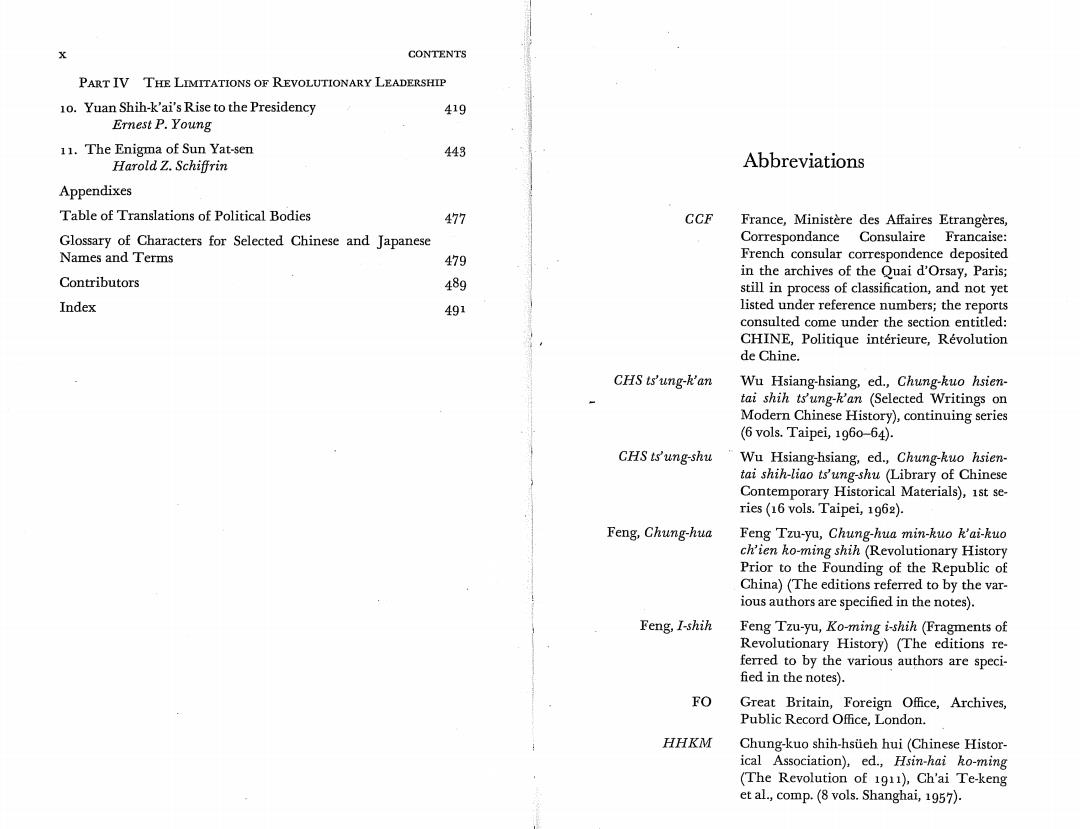
CONTENTS PART IV THE LIMITATIONS OF REVOLUTIONARY LEADERSHIP 10.Yuan Shih-k'ai's Rise to the Presidency 419 Ernest P.Young 11.The Enigma of Sun Yat-sen 443 Harold Z.Schiffrin Abbreviations Appendixes Table of Translations of Political Bodies 477 CCF France,Ministere des Affaires Etrangeres, Glossary of Characters for Selected Chinese and Japanese Correspondance Consulaire Francaise: Names and Terms 479 French consular correspondence deposited in the archives of the Quai d'Orsay,Paris; Contributors 48g still in process of classification,and not yet Index 491 listed under reference numbers;the reports consulted come under the section entitled: CHINE,Politique interieure,Revolution de Chine. CHS ts'ung-k'an Wu Hsiang-hsiang,ed.,Chung-kuo hsien- tai shih ts'ung-k'an (Selected Writings on Modern Chinese History),continuing series (6 vols.Taipei,1960-64). CHS ts'ung-shu Wu Hsiang-hsiang,ed.,Chung-kuo hsien- tai shih-liao ts'ung-shu (Library of Chinese Contemporary Historical Materials),ist se- ries(16 vols.Taipei,1962). Feng,Chung-hua Feng Tzu-yu,Chung-hua min-kuo k'ai-kuo ch'ien ko-ming shih (Revolutionary History Prior to the Founding of the Republic of China)(The editions referred to by the var- ious authors are specified in the notes). Feng,I-shih Feng Tzu-yu,Ko-ming i-shih(Fragments of Revolutionary History)(The editions re- ferred to by the various authors are speci- fied in the notes). FO Great Britain,Foreign Office,Archives, Public Record Office,London. HHKM Chung-kuo shih-hstieh hui(Chinese Histor- ical Association),ed.,Hsin-hai ko-ming (The Revolution of 1911),Ch'ai Te-keng et al.,comp.(8 vols.Shanghai,1957)
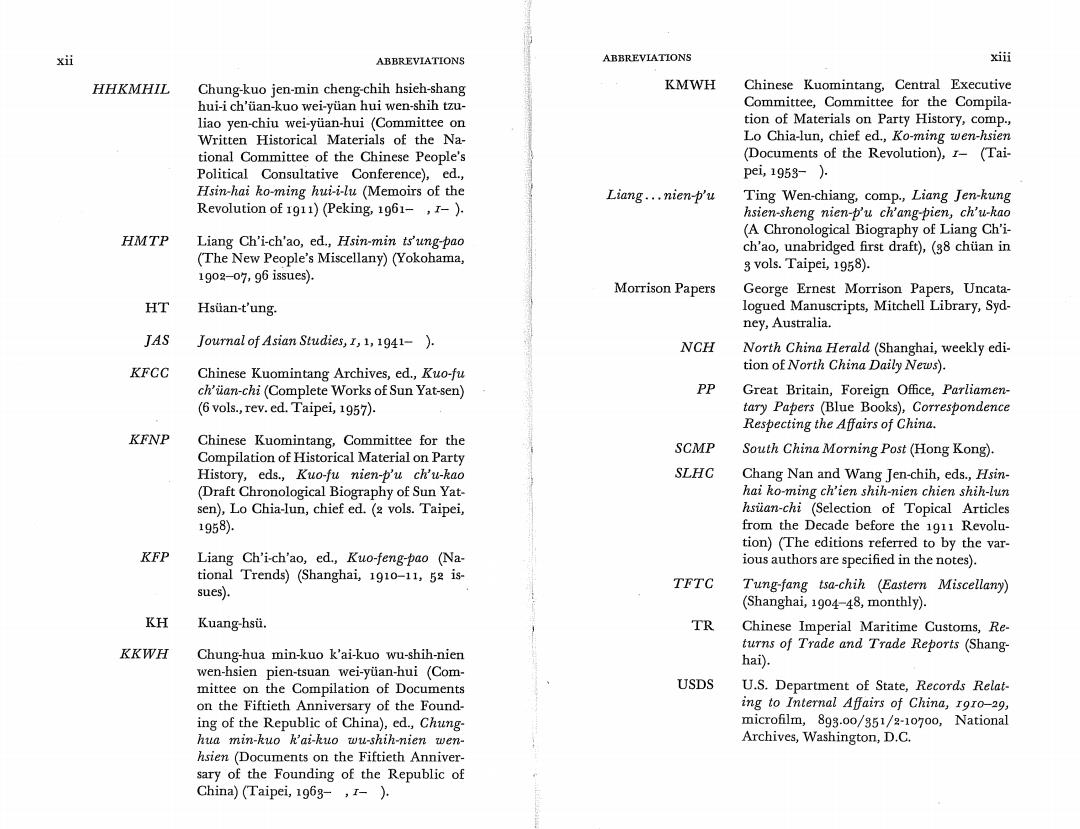
xi近 ABBREVIATIONS ABBREVIATIONS xiii HHKMHIL Chung-kuo jen-min cheng-chih hsieh-shang KMWH Chinese Kuomintang,Central Executive hui-i ch'tian-kuo wei-yiian hui wen-shih tzu- Committee,Committee for the Compila- liao yen-chiu wei-yuian-hui (Committee on tion of Materials on Party History,comp., Written Historical Materials of the Na- Lo Chia-lun,chief ed.,Ko-ming wen-hsien tional Committee of the Chinese People's (Documents of the Revolution),-(Tai- Political Consultative Conference),ed., pei,1953-). Hsin-hai ko-ming hui-i-lu(Memoirs of the Liang.…nicn-p'u Ting Wen-chiang,comp.,Liang Jen-kung Revolution of 1911)(Peking,1961-,-). hsien-sheng nien-p'u ch'ang pien,ch'u-hao (A Chronological Biography of Liang Ch'i- HMTP Liang Ch'i-ch'ao,ed.,Hsin-min ts'ung-pao ch'ao,unabridged first draft),(88 chuian in (The New People's Miscellany)(Yokohama, 3 vols.Taipei,1958). 1902-07,96i8sues). Morrison Papers George Ernest Morrison Papers,Uncata- HT Hsuan-t'ung. logued Manuscripts,Mitchell Library,Syd- ney,Australia. JAS Journal of Asian Studies,1,1,1941-). NCH North China Herald(Shanghai,weekly edi- KFCC Chinese Kuomintang Archives,ed.,Kuo-fu tion of North China Daily News). ch'iian-chi(Complete Works of Sun Yat-sen) PP Great Britain,Foreign Office,Parliamen- (6 vols.,rev.ed.Taipei,1957). tary Papers (Blue Books),Correspondence Respecting the Affairs of China. KFNP Chinese Kuomintang,Committee for the Compilation of Historical Material on Party SCMP South China Morning Post (Hong Kong). History,eds.,Kuo-fu nien-p'u ch'u-kao SLHC Chang Nan and Wang Jen-chih,eds.,HIsin- (Draft Chronological Biography of Sun Yat- hai ko-ming ch'ien shih-nien chien shih-lun sen),Lo Chia-lun,chief ed.(g vols.Taipei, hsiian-chi (Selection of Topical Articles 1958) from the Decade before the 1911 Revolu- tion)(The editions referred to by the var- KFP Liang Ch'i-ch'ao,ed.,Kuo-feng-pao (Na- ious authors are specified in the notes). tional Trends)(Shanghai,1910-11,52 is- TFTC sues). Tung-fang tsa-chih (Eastern Miscellany) (Shanghai,1904-48,monthly). KH Kuang-hsti. TR Chinese Imperial Maritime Customs,Re- KKWH turns of Trade and Trade Reports (Shang- Chung-hua min-kuo k'ai-kuo wu-shih-nien hai). wen-hsien pien-tsuan wei-yuan-hui (Com- mittee on the Compilation of Documents USDS U.S.Department of State,Records Relat- on the Fiftieth Anniversary of the Found- ing to Internal Affairs of China,191o-29, ing of the Republic of China),ed.,Chung- microfilm,893.00/851/2-10700,National hua min-kuo h'ai-kuo wu-shih-nien wen- Archives,Washington,D.C. hsien (Documents on the Fiftieth Anniver- sary of the Founding of the Republic of China)(Taipei,1963-,-)
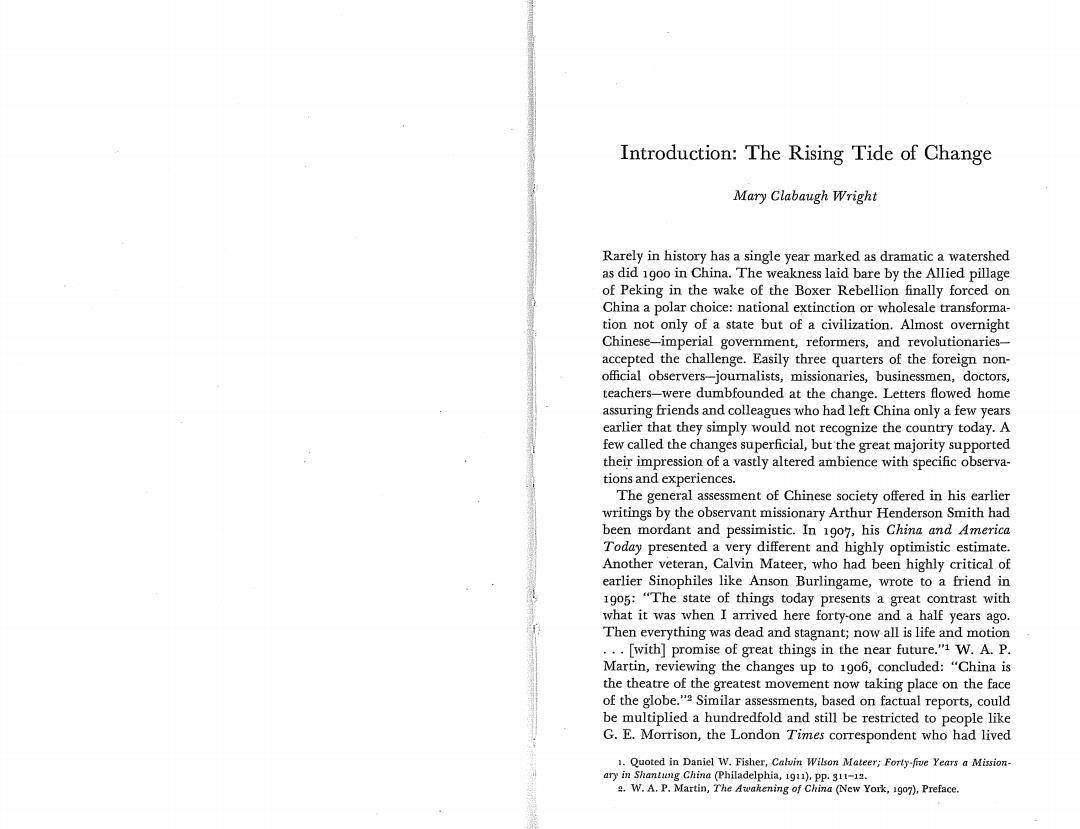
Introduction:The Rising Tide of Change Mary Clabaugh Wright Rarely in history has a single year marked as dramatic a watershed as did 1goo in China.The weakness laid bare by the Allied pillage of Peking in the wake of the Boxer Rebellion finally forced on China a polar choice:national extinction or wholesale transforma- tion not only of a state but of a civilization.Almost overnight Chinese-imperial government,reformers,and revolutionaries- accepted the challenge.Easily three quarters of the foreign non- official observers-journalists,missionaries,businessmen,doctors, teachers-were dumbfounded at the change.Letters flowed home assuring friends and colleagues who had left China only a few years earlier that they simply would not recognize the country today.A few called the changes superficial,but the great majority supported their impression of a vastly altered ambience with specific observa- tions and experiences. The general assessment of Chinese society offered in his earlier writings by the observant missionary Arthur Henderson Smith had been mordant and pessimistic.In 1907,his China and America Today presented a very different and highly optimistic estimate. Another veteran,Calvin Mateer,who had been highly critical of earlier Sinophiles like Anson Burlingame,wrote to a friend in 1905:"The state of things today presents a great contrast with what it was when I arrived here forty-one and a half years ago. Then everything was dead and stagnant;now all is life and motion ..[with]promise of great things in the near future."IW.A.P. Martin,reviewing the changes up to 1906,concluded:"China is the theatre of the greatest movement now taking place on the face of the globe."2 Similar assessments,based on factual reports,could be multiplied a hundredfold and still be restricted to people like G.E.Morrison,the London Times correspondent who had lived 1.Quoted in Daniel W.Fisher,Calvin Wilson Mateer;Forty-five Years a Mission- ary in Shantung China (Philadelphia,1911).pp.311-1. 2.W.A.P.Martin,The Awakening of China (New York,1go7),Preface
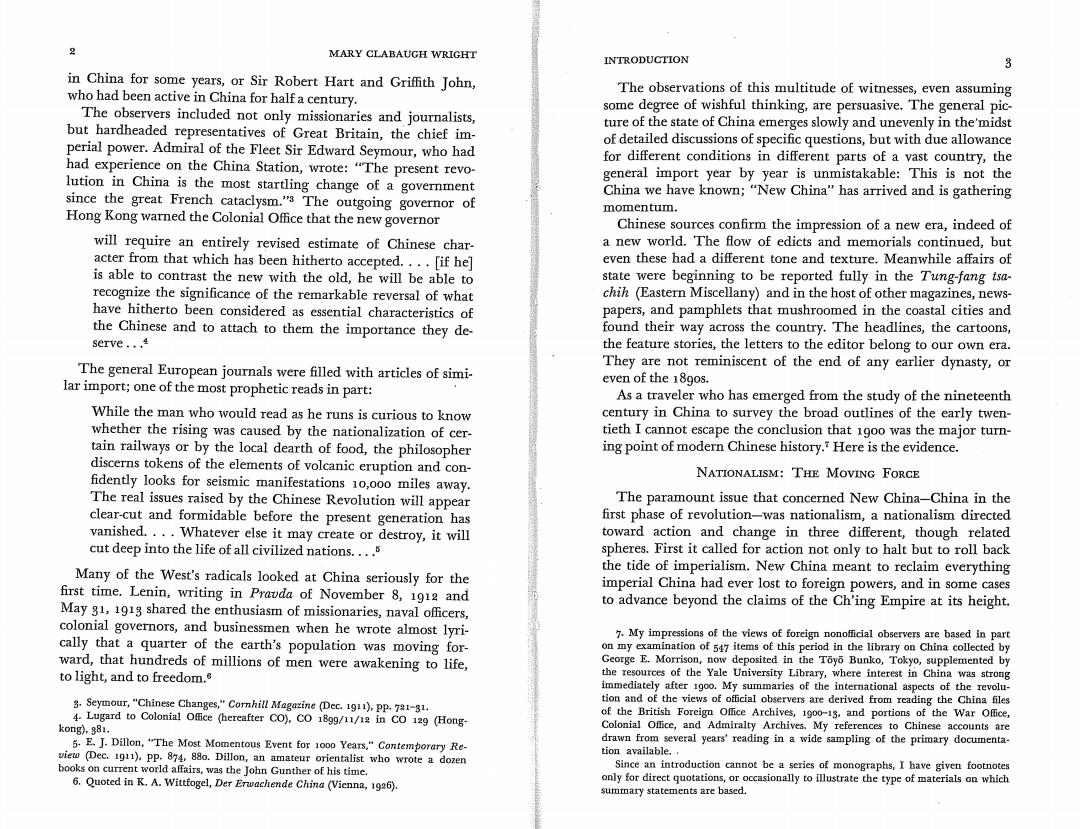
2 MARY CLABAUGH WRIGHT INTRODUCTION 9 in China for some years,or Sir Robert Hart and Griffith John, who had been active in China for half a century. The observations of this multitude of witnesses,even assuming The observers included not only missionaries and journalists, some degree of wishful thinking,are persuasive.The general pic- but hardheaded representatives of Great Britain,the chief im- ture of the state of China emerges slowly and unevenly in the'midst perial power.Admiral of the Fleet Sir Edward Seymour,who had of detailed discussions of specific questions,but with due allowance had experience on the China Station,wrote:"The present revo- for different conditions in different parts of a vast country,the lution in China is the most startling change of a government general import year by year is unmistakable:This is not the since the great French cataclysm."3 The outgoing governor of China we have known;"New China"has arrived and is gathering Hong Kong warned the Colonial Office that the new governor momentum. Chinese sources confirm the impression of a new era,indeed of will require an entirely revised estimate of Chinese char- a new world.The flow of edicts and memorials continued,but acter from that which has been hitherto accepted....[if he] even these had a different tone and texture.Meanwhile affairs of is able to contrast the new with the old,he will be able to state were beginning to be reported fully in the Tung-fang tsa- recognize the significance of the remarkable reversal of what chik (Eastern Miscellany)and in the host of other magazines,news- have hitherto been considered as essential characteristics of papers,and pamphlets that mushroomed in the coastal cities and the Chinese and to attach to them the importance they de- found their way across the country.The headlines,the cartoons, serve..4 the feature stories,the letters to the editor belong to our own era. The general European journals were filled with articles of simi- They are not reminiscent of the end of any earlier dynasty,or lar import;one of the most prophetic reads in part: even of the 18gos. As a traveler who has emerged from the study of the nineteenth While the man who would read as he runs is curious to know century in China to survey the broad outlines of the early twen- whether the rising was caused by the nationalization of cer- tieth I cannot escape the conclusion that 1goo was the major turn- tain railways or by the local dearth of food,the philosopher ing point of modern Chinese history.7 Here is the evidence. discerns tokens of the elements of volcanic eruption and con- fidently looks for seismic manifestations 10,000 miles away. NATIONALISM:THE MOVING FORCE The real issues raised by the Chinese Revolution will appear The paramount issue that concerned New China-China in the clear-cut and formidable before the present generation has first phase of revolution-was nationalism,a nationalism directed vanished....Whatever else it may create or destroy,it will toward action and change in three different,though related cut deep into the life of all civilized nations....5 spheres.First it called for action not only to halt but to roll back Many of the West's radicals looked at China seriously for the the tide of imperialism.New China meant to reclaim everything first time.Lenin,writing in Pravda of November 8,1912 and imperial China had ever lost to foreign powers,and in some cases May 1,1913 shared the enthusiasm of missionaries,naval officers, to advance beyond the claims of the Ch'ing Empire at its height. colonial governors,and businessmen when he wrote almost lyri- 7.My impressions of the views of foreign nonofficial observers are based in part cally that a quarter of the earth's population was moving for- on my examination of 547 items of this period in the library on China collected by ward,that hundreds of millions of men were awakening to life, George E.Morrison,now deposited in the Toyo Bunko,Tokyo,supplemented by to light,and to freedom. the resources of the Yale University Library,where interest in China was strong immediately after igoo.My summaries of the international aspects of the revolu- 3.Seymour,"Chinese Changes,"Cornhill Magazine (Dec.1911),pp.1-81. tion and of the views of official observers are derived from reading the China files 4.Lugard to Colonial Ofice (hereafter CO).CO 1899/11/13 in CO 129 (Hong- of the British Foreign Office Archives,1900-13.and portions of the War Office, kong),881. Colonial Office,and Admiralty Archives.My references to Chinese accounts are 5.E.J.Dillon,"The Most Momentous Event for 1o00 Years,"Contemporary Re- drawn from several years'reading in a wide sampling of the primary documenta- view (Dec.1911).pp.874,880.Dillon,an amateur orientalist who wrote a dozen tion available.. books on current world affairs,was the John Gunther of his time. Since an introduction cannot be a series of monographs,I have given footnotes 6.Quoted in K.A.Wittfogel,Der Erwachende China(Vienna,1926). only for direct quotations,or occasionally to illustrate the type of materials on which summary statements are based
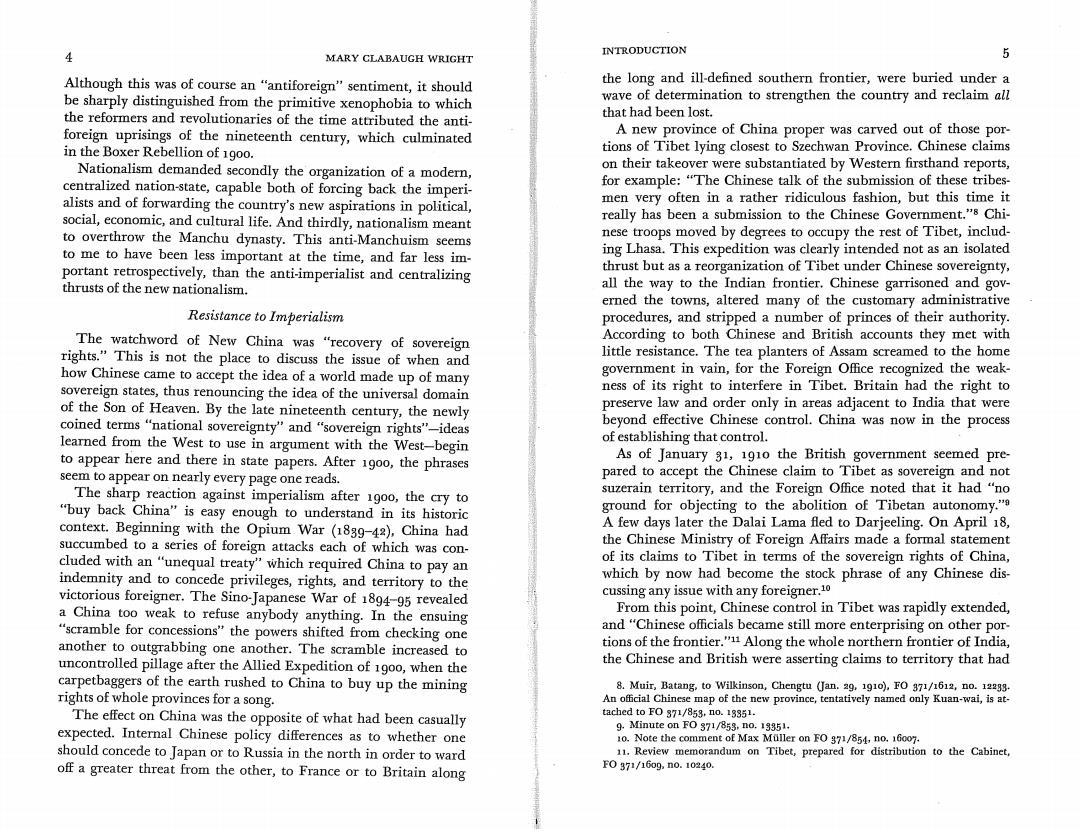
4 INTRODUCTION MARY CLABAUGH WRIGHT 5 Although this was of course an"antiforeign"sentiment,it should the long and ill-defined southern frontier,were buried under a be sharply distinguished from the primitive xenophobia to which wave of determination to strengthen the country and reclaim all the reformers and revolutionaries of the time attributed the anti- that had been lost. foreign uprisings of the nineteenth century,which culminated A new province of China proper was carved out of those por- in the Boxer Rebellion of 1900. tions of Tibet lying closest to Szechwan Province.Chinese claims Nationalism demanded secondly the organization of a modern, on their takeover were substantiated by Western firsthand reports, centralized nation-state,capable both of forcing back the imperi- for example:"The Chinese talk of the submission of these tribes- alists and of forwarding the country's new aspirations in political, men very often in a rather ridiculous fashion,but this time it social,economic,and cultural life.And thirdly,nationalism meant really has been a submission to the Chinese Government."8 Chi- to overthrow the Manchu dynasty.This anti-Manchuism seems nese troops moved by degrees to occupy the rest of Tibet,includ- to me to have been less important at the time,and far less im- ing Lhasa.This expedition was clearly intended not as an isolated portant retrospectively,than the anti-imperialist and centralizing thrust but as a reorganization of Tibet under Chinese sovereignty, thrusts of the new nationalism. all the way to the Indian frontier.Chinese garrisoned and gov- erned the towns,altered many of the customary administrative Resistance to Imperialism procedures,and stripped a number of princes of their authority. The watchword of New China was "recovery of sovereign According to both Chinese and British accounts they met with rights."This is not the place to discuss the issue of when and little resistance.The tea planters of Assam screamed to the home how Chinese came to accept the idea of a world made up of many government in vain,for the Foreign Office recognized the weak- sovereign states,thus renouncing the idea of the universal domain ness of its right to interfere in Tibet.Britain had the right to of the Son of Heaven.By the late nineteenth century,the newly preserve law and order only in areas adjacent to India that were coined terms "national sovereignty"and "sovereign rights"-ideas beyond effective Chinese control.China was now in the process learned from the West to use in argument with the West-begin of establishing that control. to appear here and there in state papers.After 1900,the phrases As of January 81,1910 the British government seemed pre- seem to appear on nearly every page one reads. pared to accept the Chinese claim to Tibet as sovereign and not The sharp reaction against imperialism after 1g00,the cry to suzerain territory,and the Foreign Office noted that it had "no "buy back China"is easy enough to understand in its historic ground for objecting to the abolition of Tibetan autonomy." context.Beginning with the Opium War (1839-42),China had A few days later the Dalai Lama fled to Darjeeling.On April 18, succumbed to a series of foreign attacks each of which was con- the Chinese Ministry of Foreign Affairs made a formal statement cluded with an"unequal treaty"which required China to pay an of its claims to Tibet in terms of the sovereign rights of China, indemnity and to concede privileges,rights,and territory to the which by now had become the stock phrase of any Chinese dis- victorious foreigner.The Sino-Japanese War of 1894-95 revealed cussing any issue with any foreigner.10 a China too weak to refuse anybody anything.In the ensuing From this point,Chinese control in Tibet was rapidly extended, "scramble for concessions"the powers shifted from checking one and "Chinese officials became still more enterprising on other por- another to outgrabbing one another.The scramble increased to tions of the frontier."Along the whole northern frontier of India, uncontrolled pillage after the Allied Expedition of 1go0,when the the Chinese and British were asserting claims to territory that had carpetbaggers of the earth rushed to China to buy up the mining 8.Muir,Batang,to Wilkinson,Chengtu (Jan.29,1910),FO 371/1612,no.12288. rights of whole provinces for a song. An official Chinese map of the new province,tentatively named only Kuan-wai,is at. The effect on China was the opposite of what had been casually tached to FO 871/853.no.13851. expected.Internal Chinese policy differences as to whether one 9.Minute on F0371853,no.13351. 10.Note the comment of Max Muller on FO 371/854.no.16007. should concede to Japan or to Russia in the north in order to ward 11.Review memorandum on Tibet,prepared for distribution to the Cabinet, off a greater threat from the other,to France or to Britain along F0371/16og,n0.10240
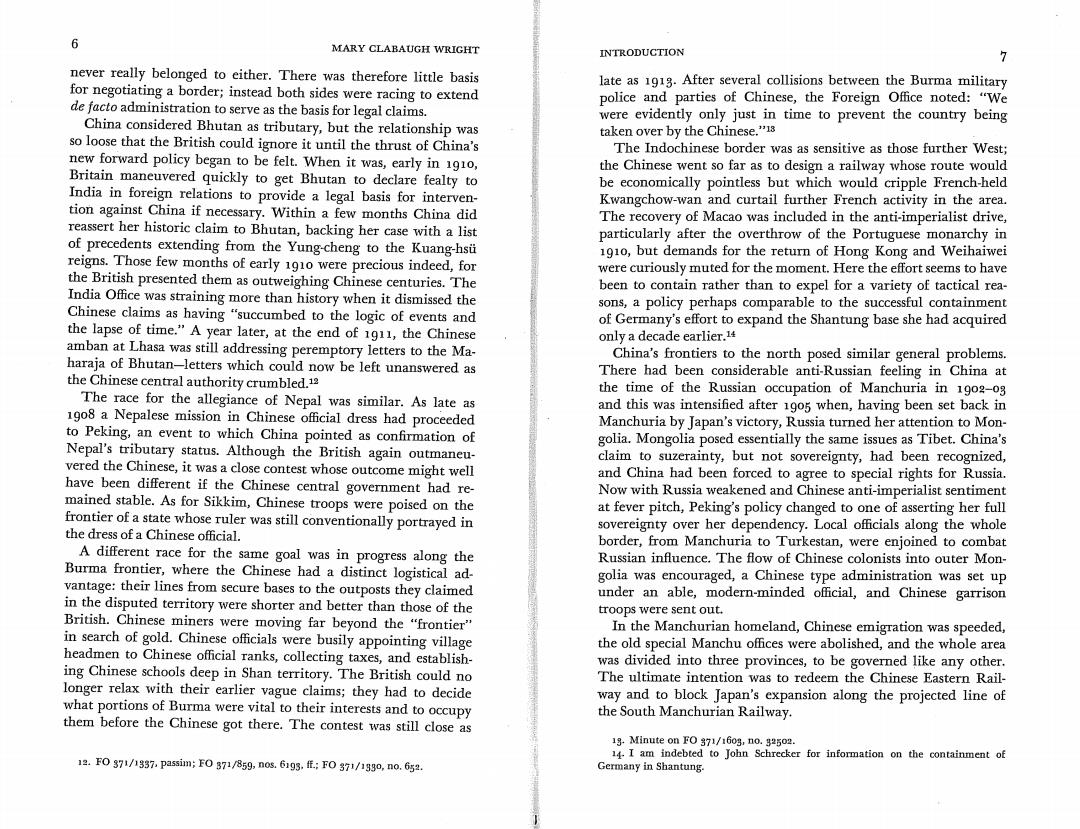
6 MARY CLABAUGH WRIGHT INTRODUCTION 7 never really belonged to either.There was therefore little basis for negotiating a border;instead both sides were racing to extend late as 1918.After several collisions between the Burma military de facto administration to serve as the basis for legal claims. police and parties of Chinese,the Foreign Office noted:"We were evidently only just in time to prevent the country being China considered Bhutan as tributary,but the relationship was taken over by the Chinese."18 so loose that the British could ignore it until the thrust of China's The Indochinese border was as sensitive as those further West; new forward policy began to be felt.When it was,early in 1910, the Chinese went so far as to design a railway whose route would Britain maneuvered quickly to get Bhutan to declare fealty to be economically pointless but which would cripple French-held India in foreign relations to provide a legal basis for interven- Kwangchow-wan and curtail further French activity in the area. tion against China if necessary.Within a few months China did The recovery of Macao was included in the anti-imperialist drive, reassert her historic claim to Bhutan,backing her case with a list particularly after the overthrow of the Portuguese monarchy in of precedents extending from the Yung-cheng to the Kuang-hsii 1910,but demands for the return of Hong Kong and Weihaiwei reigns.Those few months of early 1g10 were precious indeed,for were curiously muted for the moment.Here the effort seems to have the British presented them as outweighing Chinese centuries.The been to contain rather than to expel for a variety of tactical rea- India Office was straining more than history when it dismissed the sons,a policy perhaps comparable to the successful containment Chinese claims as having"succumbed to the logic of events and of Germany's effort to expand the Shantung base she had acquired the lapse of time."A year later,at the end of 1911,the Chinese only a decade earlier.14 amban at Lhasa was still addressing peremptory letters to the Ma- China's frontiers to the north posed similar general problems. haraja of Bhutan-letters which could now be left unanswered as There had been considerable anti-Russian feeling in China at the Chinese central authority crumbled.13 the time of the Russian occupation of Manchuria in 1go3-03 The race for the allegiance of Nepal was similar.As late as 1908 a Nepalese mission in Chinese official dress had proceeded and this was intensified after 1g05 when,having been set back in to Peking,an event to which China pointed as confirmation of Manchuria by Japan's victory,Russia turned her attention to Mon- Nepal's tributary status.Although the British again outmaneu- golia.Mongolia posed essentially the same issues as Tibet.China's claim to suzerainty,but not sovereignty,had been recognized, vered the Chinese,it was a close contest whose outcome might well have been different if the Chinese central government had re- and China had been forced to agree to special rights for Russia. mained stable.As for Sikkim,Chinese troops were poised on the Now with Russia weakened and Chinese anti-imperialist sentiment at fever pitch,Peking's policy changed to one of asserting her full frontier of a state whose ruler was still conventionally portrayed in sovereignty over her dependency.Local officials along the whole the dress of a Chinese official. border,from Manchuria to Turkestan,were enjoined to combat A different race for the same goal was in progress along the Russian influence.The flow of Chinese colonists into outer Mon- Burma frontier,where the Chinese had a distinct logistical ad- golia was encouraged,a Chinese type administration was set up vantage:their lines from secure bases to the outposts they claimed under an able,modern-minded official,and Chinese garrison in the disputed territory were shorter and better than those of the troops were sent out. British.Chinese miners were moving far beyond the "frontier" In the Manchurian homeland,Chinese emigration was speeded, in search of gold.Chinese officials were busily appointing village the old special Manchu offices were abolished,and the whole area headmen to Chinese official ranks,collecting taxes,and establish- was divided into three provinces,to be governed like any other. ing Chinese schools deep in Shan territory.The British could no The ultimate intention was to redeem the Chinese Eastern Rail- longer relax with their earlier vague claims;they had to decide what portions of Burma were vital to their interests and to occupy way and to block Japan's expansion along the projected line of the South Manchurian Railway. them before the Chinese got there.The contest was still close as 13.Minute0nF0371/i603,no.35o2. 14.I am indebted to John Schrecker for information on the containment of 12.F0371/1337,pa5sim:F0371/859,n0s.6193.ff:F0371/1g9o,n0.632. Germany in Shantung